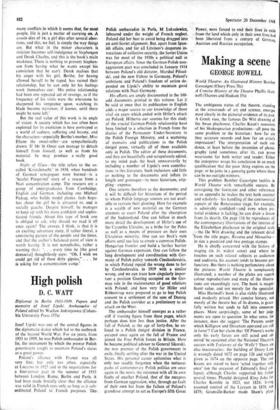NEW NOVELS
Near originals
MAURICE CAPITANCIIIK
Shades of Grey Garth St Omer (Faber 25s) Night of Glass Philip Purser (Hodder and Stoughton 21s)
'Since Eden's freshness and man's fall No rose has been original.'
T. B. Aldrich's piece of poor verse is not, alas, even accurate, for, as anyone knows, while roses are derivative, and not or-i-gin-al, every rose is a variant. Thus, as Gertrude Stein remarked, a rose is a rose is a rose : . Similarly, a novel is a novel is a novel. But there is a problem of identification with a book which does not apply to a flower. We can tell a rose by its smell, its thorns, etc, but how to tell a novel? Ultimately, no definition suffices, but surely what we look for is a unique vision, clothed in an imaginative use of lan- guage and which, today, is better kept rather short? A high proportion of all the books published as fiction falls between the true product and imitation, like roses with vague smells and rubbery thorns. Without wishing to claim too much for the, books under review, all have some originality, all are entertaining, none is over-long. And that, in one week, is almost worth celebrating.
It is not difficult to identify the literary deri- vations of Desmond Greig's first novel, The Country House. Once again, there are the ghosts of Kafka and Lewis Carroll—who seem to manifest themselves frequently—with a satirised spectre of Micky Spillane to keep them company. But it is less easy to define its peculiar difference. The basic situation is banal, but the whole is a deliberate enigma, inten- tionally unfathomable, which I suspect may be an elaborate hoax. Paul Perdix, an ad-man, invited by an acquaintance to a remote country house of which he doesn't know, or discover, the name, spends a weekend trying to pin down the beautiful Miss Lagoon, who may or may not be a Mrs Fishing, and in trying to find the host, of whose existence none of the guests seems quite sure.
No one is who or what he seems to be, and the whole becomes a horrifying parable of human behaviour when all integrity is gone. Except, of course, for Perdix, or there would be no book. The writing is, in places. crude. even boorish, and in others extremely com- petent. It seems to be one of the jokes that not only are the other characters' identities
fluid as water, but Perdix too, in a suitable moment, takes on a fantasy role, allowing 'a cynical expression, like Bogart (Casablanca) to come into his face.' Nor does he take his finer feelings seriously :
'Love gives a genius to the actions, he thought, imparts a gentleness; it must be Venus guiding hands and lips, smoothing out the clumsiness, controlling the stance, during that intoxicating moment, the same as Bacchus with the drunks —and more in the same vein, slightly be- fuddled by the sun, the warmth, the murmur- ing of bees, the insistence of scents. etc.'
What is the author trying to say? His book is the product of a strange talent, full of mock- ing self-assertion and hostility. Its sensitivity is not of positive feeling but of suspicion, in which all manifestations become evidence of persecution. If this is to your taste, you may enjoy the fantasy, the conceits, the satire. Otherwise . . .
On the surface, Shades ol Grey is as simple as The Country House is complex, but the sim- plicity is deceptive. It contains two short novels, set in the West Indies, both of which deal with themes of uprootedness and growing up. In the first, 'Lights on the Hill,' Stephen- son, a college student of mature years, cannot believe in his happiness when he falls in love, for his aspirations were crushed in earlier days. In the second, 'Another Place Another Time,' Derek Charles, a youth brought up in poverty by his widowed mother, is alienated from his childhood values by education.
These stories, economically written, are a uniquely clarified portrayal of a society with
many conflicts in which it seems that, for most people, life is just a matter of carrying on. A cousin dies of an, a girl dies after several
and this,.we feel, is simply the way things are. But what in the minor charactets. is
stoicism becomes self-indulgence in Stephentson
and Derek Charles, and this is the book's.main weakness. There is nothing to prevent Stephen- son from having what he wants except -his conviction that he can't. Derek realises that his anger with his girl, Berthe, for having allowed herself to be raped, has ruined their relationship, but he can only let his feelings work themselves out : 'His entire relationship had been one repeated act of revenge, as if the frequency of his visits were the whetstone he sharpened his vengeance upon, watching its blade become narrower, if keener, until there might be none left.'
But the real value of this work is its angle of vision. A society which has too often been
exploited for its exoticism is here portrayed as
a world of sadness, suffering and beauty, and the characters—especially Berthe's mother, Miss
Eliane the sweet-seller—are sympathetically drawn. If Mr St Omer can manage to detach himself from himself, as well as froth his material, he may produce a really good book.
Night of Glass—the title refers to the so- called `Kristalenaeht,' in 1938, when hundreds
of German - synagogues were burned—is a `Scarlet Pimpernel' story of a rescue from a Nazi concentration camp. The rescuers are a group of undergraduates from Cambridge, English and German, including one .Michael Pickup, who builds model planes, feels hope- less about the girl he is attracted to, and is socially gauche. Despite himself, he manages to keep up with his more confident and sophis- ticated friends. About this type of book one is obliged to ask, why should we read it all once again? The answer, I think, is that it is an exciting adventure story, if rather literal, a convincing picture of the people and the times, and that the author's balanced point of view is worth having. It is not xenophobic, rather a warning that: . . every time he [the good democrat] thoughtlessly says: "Oh, I wish we could get rid of these dirty gipsies," . . . he is asking for a concentration camp.'



































 Previous page
Previous page